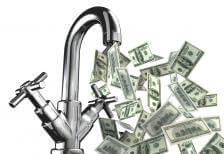Your Net Worth and Cash Flow
You can’t know where you’re going financially before you know where you are today.

Happy holidays everyone! The end of the year is almost here and it’s a good time to take a quick inventory to see how you’re doing financially. Reviewing your finances at the end of the year is a great way to get ready to set financial goals for the year ahead, which I will cover in next week’s episode.
Now, planning your financial future is a lot like planning a road trip. To plan a road trip, you first need to know where you’re starting from. The same thing goes for your financial future. To plan where you’re going financially, you first need to have a clear picture of where you are now. And that’s what taking a financial inventory is all about – knowing where you are today.
If you haven’t taken a financial inventory before, here’s how to do it.
There are two fundamental components of financial health: your net worth and your cash flow.
Know Your Net Worth
Calculating your net worth is the best way to get a quick read on your financial health. Your net worth is simply your assets minus your debts. To calculate it, add up the value of all the assets you now own including cash, stocks, bonds, retirement accounts, the value of your home and investment real estate, the value of any businesses you own, and the approximate value of your stuff, like your car, your furniture, and your secret prized collection of vintage Beatles lunch boxes.
Next, add up all your debts, including mortgages, car loans, credit card debt, student loans, and any other debt you have.
Subtract your total debt from the value of your assets. The number you get is your net worth.
When you have this number, write it down and take a look. If it’s smaller than you want it to be or even negative, don’t panic, but do plan to set a goal for the new year to increase your net worth.
Know Your Cash Flow
The other fundamental component of your financial health is your cash flow. Do you have money left over at the end of the month or month left over at the end of the money?
To see where your cash flow stands, add up all your expenses for a typical month, like your rent or mortgage payment, cost of food, utility bills, childcare, and gas, and don’t forget those peanut M&Ms you like to get a few times a week. Subtract the total of your typical monthly expenses from your monthly take-home earnings. The result is your monthly cash flow.
If the number is positive, congratulations! You can use your positive cash flow to invest and grow your net worth to accomplish your goals. But if your expenses are higher than your income, then it’s time to make changes to increase your income and lower your expenses to create positive cash flow that you can put to work for you.
Write down your monthly cash flow number. You’ll want to refer back to it when setting goals for the upcoming year.
Chart Your Progress
If you use a program like Quicken to track your finances, you can easily chart your net worth and see the progress you’re making. There are also online calculators that you can use. Here’s a net worth calculator you can use (there are more at the bottom of this page). It’s a smart idea to set a regular interval for calculating your net worth and evaluating your progress – I recommend doing it at least once a year or, better yet, quarterly. And, you can also use Quicken to track your cash flow; that is, your income and expenses.
If you prefer pen and paper to pushing pixels, fill out a loan application. Not because you really want to apply for a loan, but because a standard loan application is all about assessing these two fundamental components of your financial health: your net worth and your cash flow. Actually, a loan application shows a variation on cash flow that focuses on your income and your housing-related expenses. Here’s a link to a standard loan application form< that you can print out and complete.
Remember, you can’t know where you’re going financially before you know where you are today. So take a snapshot of your net worth and your monthly cash flow before the year is over. It will put you in position and give you the information you need to set financial goals for 2008.
-
Net Worth Calculator
-
Residential Loan Application

